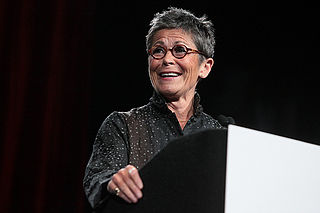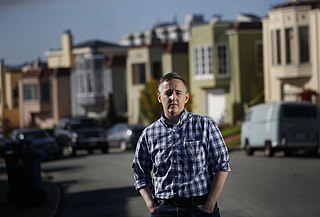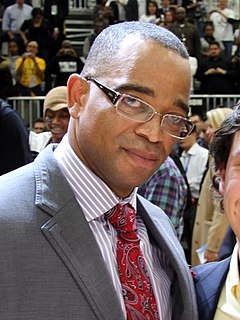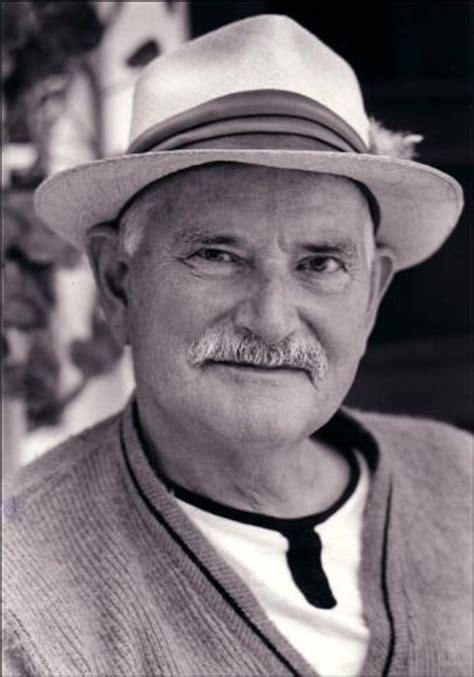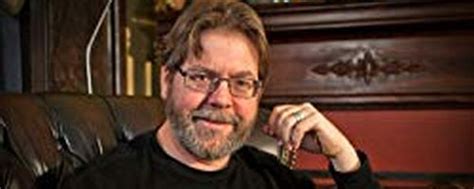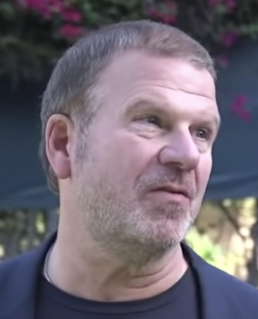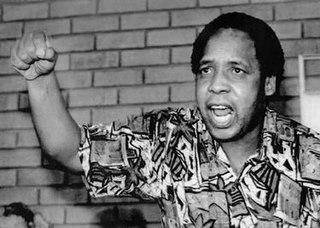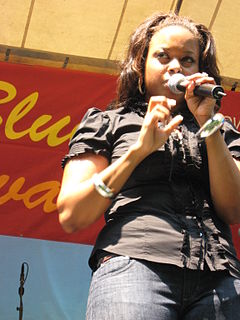Top 1063 Urban Sprawl Quotes & Sayings - Page 18
Explore popular Urban Sprawl quotes.
Last updated on November 20, 2024.
In his second term, [Ronald] Reagan completed the work of his first term - the rich got really rich, everything was deregulated, advocacy programs were quashed, the Savings and Loan program was trashed, the deficit was tripled, unions were busted, Housing and Urban Developing was in shambles, banks were closing, the military got lots of new toys, the religious right was strong, and AIDS was ignored.
The Democrat Party coalition has now been outnumbered. The Democrats threw away their allegiance to white working-class voters. They basically discarded everybody who's white that doesn't have a college education. Well, that is a huge number of people. The Democrats instead decided to build a coalition of minorities and illegal immigrants and union workers, and they are dwindling in number, and they are localized. They are in urban areas in a few big cities. We outnumber them now, and we can cement this for a huge amount of the future.
I won't deny the polemical elements in my work, but they are less in the service of attempting to reform human behavior than the delighted exercise of my rather malicious sense of humor - especially vis-a-vis the horrifying everyday environment we have produced for ourselves. These mall-scapes, burb-scapes, urban wildernesses, starchitect stunts, and other toxic contexts for our daily lives express about every human vice, stupidity, and blunder that it is possible for a society to make. It all leads, really, to a psychological place where only comedy or despair make sense.
I've been making 16mm urban landscape films about San Francisco for many years. I choose different nonfiction themes to investigate and am generally interested in surfacing lesser-known histories. I like to investigate and illuminate these histories, combining them with my own unconventional storytelling style, which is generally a stream-of-consciousness voiceover involving a steady stream of personal reflections on pining over unavailable women.
Prison is quite literally a ghetto in the most classic sense of the word, a place where the U.S. government now puts not only the dangerous but also the inconvenient—people who are mentally ill, people who are addicts, people who are poor and uneducated and unskilled. Meanwhile the ghetto in the outside world is a prison as well, and a much more difficult one to escape from than this correctional compound. In fact, there is basically a revolving door between our urban and rural ghettos and the formal ghetto of our prison system.
The right to the city is far more than the individual liberty to access urban resources: it is a right to change ourselves by changing the city. It is, moreover, a common rather than an individual right since this transformation inevitably depends upon the exercise of a collective power to reshape the processes of urbanization. The freedom to make and remake our cities and ourselves is, I want to argue, one of the most precious yet most neglected of our human rights.
The economic distress of America's inner cities may be the most pressing issue facing the nation. The lack of businesses and jobs in disadvantaged urban areas fuels not only a crushing cycle of poverty but also crippling social problems such as drug abuse and crime… A sustainable economic base can be created in the inner city, but only as it has been created elsewhere: through private, for-profit initiatives and investment based on economic self-interest and genuine competitive advantage.
I saw in Chicago, on the street where I was visiting my sister-in-law, this "Urban Renewal" and it means one thing: "Negro removal." But they want to tear the homes down and put a parking lot there. Where are those people going? Where will they go? And as soon as Negroes take to the street demonstrating, one hears people say, "they shouldn't have done it." The world is looking at America and it is really beginning to show up for what it is really like. "Go Tell It on the Mountain." We can no longer ignore this, that America is not "the land of the free and the home of the brave."
I love everything black, because black is cool. When something crosses over, people are like, "Oh, this is a crossover." First of all, there is no urban anymore. Pop culture is black. White kids are dressing like black kids. It's all crossed the lines now. The way I understand it is, everything black is cool. When it crosses over to white, that means it's going from cool to uncool. That's what crossover is.
We kind of know that food is necessary to survive. But our ways of connecting with food have been, in many ways, taken over by capitalism - certainly taken over by the influence large corporations have on the way that we eat and the way that we think about food. That's why kids these days are more prepared to take nutritional advice from Ronald McDonald than they are from their parents or their teachers or from scientists. And particularly in urban areas, you'll see kids who honestly believe tomatoes come from the supermarket rather than from a plant.
Louisville is a place with no labels. It’s not the South, it’s not Chicago, and you don’t think of it as you think of New York or LA. It has some Southern romanticism to it, but also a Northern progressivism, this weird urban island in the middle of the state of Kentucky that has always provided a fertile, often dark, bed. For us, Louisville and the surrounding areas are the center of massive creativity and massive weirdness. The place has its flaws: You move away, but you’re always going to come back.
Poor children live in a particularly dangerous world--an urban world of broken stair railings, of busy streets serving as playgrounds, of lead paint, rats and rat poisons, or a rural world where families do not enjoy the minimal levels of public health accepted as standard for nearly a century. Whether in city or country, this is a world where cavities go unfilled and ear infections threatening permanent deafness go untreated. It is world where even a small child learns to be ashamed of the way he or she lives.
While my chosen form of story-writing is obviously a special and perhaps a narrow one, it is none the less a persistent and permanent type of expression, as old as literature itself. There will always be a certain small percentage of persons who feel a burning curiosity about unknown outer space, and a burning desire to escape from the prison-house of the known and the real into those enchanted lands of incredible adventure and infinite possibilities which dreams open up to us, and which things like deep woods, fantastic urban towers, and flaming sunsets momentarily suggest.
I'm 13 to 17, 18 years old; I thought that's what the world was like. It never occurred to me that this was a very unusual period in music history. So I went on assuming that one day I'm going to have my band like my heroes had their own band. So people ask me this question all the time - they go, "Bass is basically a background instrument." The other thing is that in urban music, Black music, the bass has a much higher profile.
A lot of rappers say 'I'm talking about stuff that goes on, what I grew up in, that I know about.' And these journalists say, 'Yeah, but you're making 80 million dollars, that stuff's not about you.' Look how long he's been making 80 million. He grew up poor in an urban city and the things he's experienced and knows.
There isn't a river or creek in the country - or there are very few - that doesn't have some small group of people working on a restoration or creek cleanup project. Let me give you one example that's a great metaphor: In Washington, D.C., there is a group called the Anacostia Watershed Society. Two rivers converge and define Washington - one which everybody knows about, the Potomac, and the Anacostia, which they don't. The Anacostia is one of the most polluted urban rivers in the country.
To me, money is a means to do good. I reached a point in my life where I had enjoyed tremendous business success that afforded my family everything we could possibly want. My wife and I then decided that we could use our wealth to make a difference. So we created the Broad Foundations to do four things: to improve urban public education, to support innovative scientific and medical research, to foster art appreciation for audiences worldwide and to support civic initiatives in Los Angeles.
To the extent that our workers compete with low-paid Mexicans, it is as much through undocumented immigration as trade. This pattern threatens low-paid, low-skill U.S. workers. The combination of domestic reforms and NAFTA-related growth in Mexico will keep more Mexicans at home. It is likely that a reduction in immigration will increase the real wages of low-skilled urban and rural workers in the United States.
One can see from space how the human race has changed the Earth. Nearly all of the available land has been cleared of forest and is now used for agriculture or urban development. The polar icecaps are shrinking and the desert areas are increasing. At night, the Earth is no longer dark, but large areas are lit up. All of this is evidence that human exploitation of the planet is reaching a critical limit. But human demands and expectations are ever-increasing. We cannot continue to pollute the atmosphere, poison the ocean and exhaust the land. There isn't any more available.
Each of the Iraqi children killed by the United States was our child. Each of the prisoners tortured in Abu Ghraib was our comrade. Each of their screams was ours. When they were humiliated, we were humiliated. The U.S. soldiers fighting in Iraq - mostly volunteers in a poverty draft from small towns and poor urban neighborhoods - are victims just as much as the Iraqis of the same horrendous process, which asks them to die for a victory that will never be theirs.
Hip-hop I never really got really into mainly just because I'm not a big fan of rap. I do like R&B artists like Beyonce. I'm a big fan of her mainly because of her vocals. They're just so awesome. I love her and Christina Aguilera, and that whole urban kind of feel is really great, especially with my voice.
Our politics and science have never mastered the fact that people need more than to understand their obligation to one another and to the earth; they need also the feeling of such obligation, and the feeling can come only within the patterns of familiarity. A nation of urban nomads, such as we have become, may simply be unable to be enough disturbed by its destruction of the ecological health of the land, because the people's dependence on the land, though it has been expounded to them over and over again in general terms, is not immediate to their feelings.
This was early '90s and in New York hip-hop was coming on really strong; that was the sort of urban folk music that was almost threatening to eclipse rock music and indie rock music in terms of popularity, which it has certainly gone on to do. But you know, this is the end of the 1980s, beginning of the '90s. The whole independent label thing has really evolved to this incredible point from the early '80s when we started, and there wasn't one record label at all, until a couple people started forming these small labels.
The earthquake in Haiti was a class-based catastrophe. It didn't much harm the wealthy elite up in the hills, they were shaken but not destroyed. On the other hand the people who were living in the miserable urban slums, huge numbers of them, they were devastated. Maybe a couple hundred thousand were killed. How come they were living there? They were living there because of-it goes back to the French colonial system-but in the past century, they were living there because of US policies, consistent policies.
Until the 1930s, the Constitution served as a major constraint on federal economic interventionism. The government's powers were understood to be just as the framers intended: few and explicitly enumerated in our founding document and its amendments. Search the Constitution as long as you like, and you will find no specific authority conveyed for the government to spend money on global-warming research, urban mass transit, food stamps, unemployment insurance, Medicaid, or countless other items in the stimulus package and, even without it, in the regular federal budget.
When I came to Detroit, if you threw a stone up in the air it would hit an autoworker on its way down. A few years after that, if you threw a stone in the air it'd hit an abandoned house or a vacant lot on its way down. And most people saw those vacant lots as blight. But meanwhile during World War II, blacks had moved from the South to the North. And they saw these vacant lots as places where you could grow food for the community. And so urban agriculture was born.
I grew up in Memphis, Tennessee; I went to college in New Orleans before moving to New York City for graduate school. Both sets of my grandparents grew up in rural Mississippi and brought a lot of agrarian knowledge to Memphis, which is an urban center in the South. Both sets had amazing backyard gardens. My paternal grandfather, practically every inch of available space was green.
I think because it is a very well-saturated story,episode of Justified in Hannibal, and we've all heard it in some frame of a story, we've heard the urban legend of waking up in a bathtub with a kidney missing. It felt like if we are telling an organ-harvesting story, it was really about quickly selling the iconography of an organ-harvesting story, and then being able to mask that as a perfect way for Hannibal Lecter to go shopping for his menu.
I am glad that the country world...retains a power to use our English tongue. It is a part of its sense of reality, of its vocabulary of definite terms, and of its habit of earthly common sense. I find this country writing an excellent corrective of the urban vocabulary of abstractions and of the emotion disguised as thinking which abstractions and humbug have loosed upon the world. May there always be such things as a door, a milk pail, and a loaf of bread, and words to do them honor.
The other thing that I got back then - the Parker novels have never had much of anything to do with race. There have been a few black characters here and there, but the first batch of books back then, I got a lot of letters from urban black guys in their 20s, 30s, 40s. What were they seeing that they were reacting to? And I think I finally figured it out - at that time, they were guys who felt very excluded from society, that they had been rejected by the greater American world.
Wickedly Dangerous translates a terrifying figure from folklore , the Baba Yaga, into the smart, resourceful, motorcycle-riding Barbara Yager, who travels with her dragon-disguised-as-a-dog best friend, righting wrongs and helping those in need. But when she stumbles into a town whose children are vanishing, and meets the haunted young sheriff trying to save them, what was a job becomes very personal. This is urban fantasy at its best, with all the magic and mayhem tied together with very human emotions, even when the characters aren't quite human.
There are masses of people who need affordable housing in New York. I think that, politically, it is very difficult to give preference to artists over another group. Now, could there be an impressive envisioning process where developers would be asked to collaborate with urban designers? Maybe envision a large-scale development with local shops, dense housing, maybe a few towers, maybe a few mid-rise buildings, and art workshops in the mix? That would be great. I don't see a call for those proposals. But I think that it would not be outrageous to propose that kind of vision.
Today's children are living a childhood of firsts. They are the first daycare generation; the first truly multicultural generation; the first generation to grow up in the electronic bubble, the environment defined by computers and new forms of television; the first post-sexual revolution generation; the first generation for which nature is more abstraction than reality; the first generation to grow up in new kinds of dispersed, deconcentrated cities, not quite urban, rural, or suburban.
I felt that there's an obligation when writing a piece about an urban expressway made in the 50s to acknowledge the context, and Robert Moses is sort of an iconic figure in New York, and he influenced the shape of the city more than anyone else before or after him. He was one of the most powerful and influential civic architects in the world, because of how much he transformed the city. He built multiple bridges and highways and parks and recreational spaces, beaches - in the course of a few decades, he completely changed the city
Socialism is not about big concepts and heavy theory. Socialism is about decent shelter for those who are homeless. It is about water for those who have no safe drinking water. It is about health care, it is about a life of dignity for the old. It is about overcoming the huge divide between urban and rural areas. It is about a decent education for all our people. Socialism is about rolling back the tyranny of the market. As long as the economy is dominated by an unelected, privileged few, the case for socialism will exist.
Not to find one's way around a city does not mean much. But to lose one's way in a city, as one loses one's way in a forest, requires some schooling. Street names must speak to the urban wanderer like the snapping of dry twigs, and little streets in the heart of the city must reflect the times of day, for him, as clearly as a mountain valley. This art I acquired rather late in life; it fulfilled a dream, of which the first traces were labyrinths on the blotting papers in my school notebooks.
Noise pollution is basically defined as the presence of simple information that makes it impossible to hear all the other more delicate - and often more important - information. Noise pollution creates, if you will, dumb environments. Our industrial areas, many of our downtown urban areas, are dumb acoustic environments. Very simple, very loud, often unhealthy.
Directors who have inspired me include Billy Wilder, Federico Fellini, lngmar Bergman, John Ford, Orson Welles, Werner Herzog, Stanley Kubrick, Alfred Hitchcock, Francis Ford Coppola and Ernst Lubitsch. In art school, I studied painters like Edward Hopper, who used urban motifs, Franz Kafka is my favorite novelist. My approach to film stems from my art background, as I go beyond the story to the sub-conscious mood created by sound and images.
Modern man lives isolated in his artificial environment, not because the artificial is evil as such, but because of his lack of comprehension of the forces which make it work- of the principles which relate his gadgets to the forces of nature, to the universal order. It is not central heating which makes his existence 'unnatural,' but his refusal to take an interest in the principles behind it. By being entirely dependent on science, yet closing his mind to it, he leads the life of an urban barbarian.
Ironically, though our society of affluence brings safety and stability, it doesn't bring psychological health. As wealth goes up, suicide and depression rates tend to go up. I read one study that compared women in North America with women in Nigeria, and the group with the highest rates of depression was urban North American women, which is the wealthiest. Now, there are obviously huge stresses that come with poverty, but the poorer the society, the more collaborative people have to be.
I think when you write every song on your album - it's like having eleven or twelve children. It's hard to say I like this one song more or I like that one more. I love every song on the album. What's happening is that I'm hoping that everyone will be very satisfied. I think the single "Good Girl" will be adored by the people in the urban world and I think the "Best of Me" will be loved by people in the pop world.
I wanted to make sure the focus [in The Land] was on human beings themselves and their decisions, but still connected to the urban environment that people associate as being black. I think I was able to make a film without commenting on "black this or black that" and you still feel the presence of it. There's no one character who's saying "we're all black and we're all in this struggle." It's that you just feel it. Some of that is because we get the sense from a lot of independent films that black people struggle all the time.
